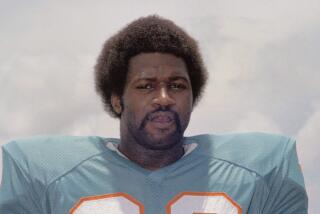J. Berwanger, 88; Won First Heisman Trophy
- Share via
Jay Berwanger, the first in a long line of Heisman Trophy winners as college football’s 1935 player of the year, died Wednesday night of lung cancer at his home in Oak Brook, Ill., a Chicago suburb. He was 88.
Berwanger, who played halfback at the University of Chicago shortly before the school dropped football, was the first player drafted by the National Football League, but he never played the pro game.
“There was no money in pro football then,” he said a few years ago. “Remember, that was during the Great Depression. I thought I’d have a better future by using my education rather than my football skills.”
Berwanger learned that he had been drafted when he read about it in a newspaper.
“I didn’t even know there was a draft going on,” he told the Hartford Courant in 1994. “I think Bronko Nagurski was the highest paid and he was getting about $7,000. It wasn’t until years later when [Charley] Trippi signed with the [Chicago] Cardinals for $100,000 for three years. My timing was all wrong, but I don’t feel cheated. I’ve had a great life.”
He was drafted by the Philadelphia Eagles, who offered him $125 to $150 a game. Later, the Chicago Bears obtained the rights to Berwanger, who loved to tell of a chance meeting with George Halas, founder-owner-coach of the Bears.
“I met him in the lobby of a hotel where I was with a date. He asked me what I wanted. When I told him, ‘Two years, 25, no cut,’ meaning $25,000 for two years [and a guaranteed contract], he tipped his hat to my date and said, ‘Have a good night.’ That was it.”
At Chicago, the 6-foot, 195-pound Berwanger ran, passed, punted, blocked and kicked extra points on offense, played halfback on defense, and returned punts and kickoffs.
Technically, Berwanger is the wrong answer to the question, “Who was the first Heisman Trophy winner?” Larry Kelley, a Yale end, won the first award so designated in 1936. When Berwanger was honored, it was called the Downtown Athletic Club Award, after the New York organization presenting it.
John Heisman, a famous football coach, died in October 1936, and the award then was renamed for him.
“I still think of myself as the first, kind of like being George Washington,” Berwanger once said.
He was notified of his selection by telegram, which said the Downtown Athletic Club would send him two airplane tickets, one for himself and one for his coach, to a luncheon in New York.
“My biggest thrill wasn’t getting the award, it was the fact that it was going to be my first ride on an airplane,” he said.
He gave the trophy to his aunt, who used it for years as a doorstop before Berwanger reconsidered and gave it to the University of Chicago, where it is in storage until a new athletic center is completed. A replica trophy is on display at his high school in his hometown of Dubuque, Iowa.
“I only wish I had a third trophy, so I could give it to my grade school,” he once said.
The highlights of his football career were an 85-yard touchdown run against Ohio State, and a punt-return touchdown and the kicked extra-point in a 7-6 victory over Illinois. Against Minnesota he made 15 solo tackles.
Berwanger’s first coach at Chicago was the legendary Amos Alonzo Stagg, who after a season was succeeded by Clark Shaughnessy, famous as the creator of the T-formation. Four years after Berwanger graduated, Chicago dropped football.
In addition to his gridiron exploits, Berwanger was captain of the track team and senior class president before graduating in 1936. He was expected to be a candidate for the U.S. Olympic team in the decathlon but declined to try out because training would have interfered with his studies.
After graduating, he became a foam-rubber salesman and later founded Jay Berwanger Inc., a manufacturer of plastic and sponge-rubber strips for car doors and farm machinery. He also briefly wrote a sports column for the Chicago Daily News, and officiated college football games--he was the field judge for the 1949 Rose Bowl game between Northwestern and California (Berkeley). During World War II, he was a naval aviator.
As a member of the Heisman Trophy selection committee, Berwanger took his duties seriously and tried to see as many candidates as possible each season.
“Today’s players are fine young men and at least 100 pounds bigger than I was,” he said while attending last year’s Heisman Trophy presentation. “There have been a lot of changes in football, but I still love every aspect of the game.
“I’ve been lucky. I’ve picked the right [Heisman] award winner four out of five times.”
Berwanger is survived by two sons and a daughter.
More to Read
Go beyond the scoreboard
Get the latest on L.A.'s teams in the daily Sports Report newsletter.
You may occasionally receive promotional content from the Los Angeles Times.










